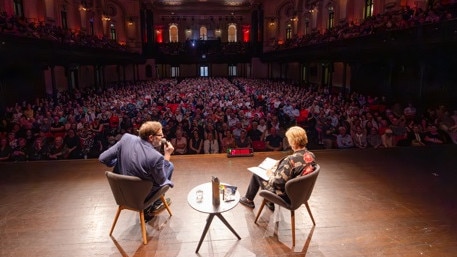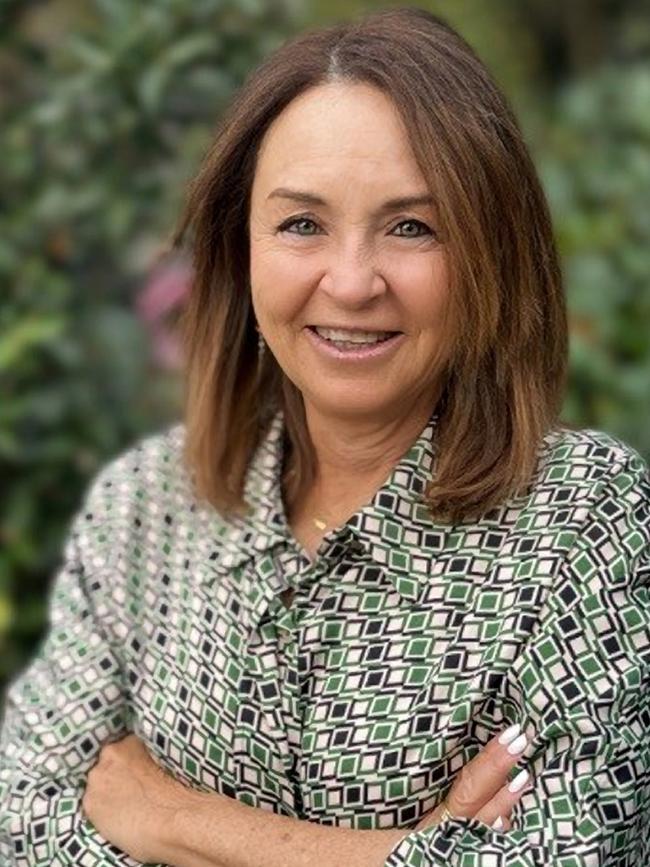Sydney Writers Festival chief Kathy Shand quits over line-up of fiercely anti-Israel poets, writers on program
Esteemed Australian businesswoman Kathy Shand has resigned as chair of the high-profile festival telling the board she wanted a variety of opinions on the Middle East conflict, and not a one-sided, anti-Israel show.

Esteemed Australian businesswoman Kathy Shand has quit as chair of the high-profile Sydney Writers’ Festival over concerns some speakers may present views that are deeply anti-Semitic.
Ms Shand, who has poured millions into the arts and children’s hospitals in Australia, is believed to be concerned about the preponderance of fiercely anti-Israel poets and writers on the program, which is due to be launched on March 13.
The Australian understands that Ms Shand told the board she wanted a variety of opinions on the Middle East conflict, and not a one-sided, anti-Israel show.
While the program hasn’t yet been released, it is believed to include writers such as Sydney’s Michael Mohammed Ahmad, who have accused Israel of ethnic cleansing and genocide.
It is not clear that any writers have been invited to speak about Israel’s right to exist.
It is believed that themes for this year’s festival include “global conflict” and “geopolitics” and speakers on these topics include writers at the forefront of anti-Israel sentiment in Australia.

“Artistic freedom and independence are to be guarded and cherished,” Ms Shand wrote in a resignation statement. “But freedom of expression cannot and should not be used as a justification to accept language and conversations that compromise the festival as a safe and inclusive space for all audiences. Every session that is planned needs to reflect the values of the festival and represent the highest standard of consideration and curation.
“The reputation of the Sydney Writers’ Festival has been hard won and is well deserved. This needs to be protected and great care needs to be taken with the stages that carry the imprimatur of the festival. At a time when cultural organisations are faced with challenges, I wish the festival well.”
Ms Shand replaced University of Sydney vice-chancellor Mark Scott as chair of the festival in 2023. She had been recognised in the Queen’s Birthday Honours in 2022 for “services to Sydney Writers’ Festival as chair and board member, Sydney Opera House and Sydney Jewish Museum”.
Following her resignation, the Sydney Writers’ Festival board immediately appointed a new chair, Robert Watkins, of Ultimo Press, who said: “The Sydney Writers’ Festival proudly champions freedom of expression, freedom of speech and respectful debate. The board firmly believes that the 2025 festival program, scheduled for announcement on March 13, will demonstrably reflect the festival’s ongoing commitment to presenting a plurality of voices, a diversity of thought, and a program that will deeply engage our audience. This includes both Jewish and Palestinian writers and thought leaders.
“The board are united and supportive of the 2025 program.”
The Australian understands the board has approved the inclusion of three Jewish writers, among them Michael Visontay, who has written a book about his family’s experience of the Holocaust.
The festival will take place between May 19 and 27.
The creative professions in Australia have been torn apart by debate over the war in the Middle East. Emphasis over the past two years has been placed on anti-Israel speakers, many of whom believe the Jews have “colonised” Palestine, and do not have a legitimate right to call Israel home.
Some Jewish writers, such as singer Deborah Conway, have found themselves “uninvited” from festivals, after expressing support for the Jewish state. Others, like the former editor of The Age, Michael Gawenda, say they have been excluded from some events.
The law firm Minter Ellison withdrew its support from the Adelaide Writers Festival in 2023 after one of the Palestinian writers on the program described Israel as a “terrorist, genocidal nation”.
The debate has spilled from writers festival into the arts more broadly: Creative Australia, which replaced the Australia Council, this month withdrew the invitation it had extended to artist Khaled Sabsabi to represent Australia at the Venice Biennale, citing concerns over his decision to include images of a terrorist, Hassan Nasrallah, in his works.
The Melbourne Writers Festival lost its deputy chairman, Leslie Reti, last year, again over concerns that the program was not balanced, but anti-Israel.
The Sydney Theatre Company suffered several resignations when three members of the cast of The Seagull donned Palestinian scarves during a curtain call.



